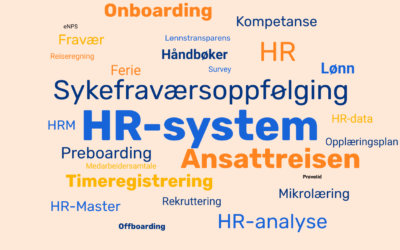From chaos to control: HR-Master integrations at the corporate level

Blog series: How to simplify and improve people's lives
For large corporations, it is crucial to have an effective HR system that can be seamlessly integrated with a number of business applications, with the HR system acting as the master in the business, ensuring that information is recorded and maintained in one place.
This ensures that all necessary HR functions and integrations are supported across the group, both now and in the future. From secure and simple access management with EntraID to seamless payroll processing and efficient resource planning – a komplett HR systems with extensive integration capabilities can really simplify the way HR is managed at the corporate level.
Let's dive deeper into how these integrations can take your group to the next level!
Why are HR-Master integrations important in a corporate context?
- EntraID (Active Directory+SingleSignOn):
Integration with EntraID and automatic login with the company account provides simple and secure access management, which is essential for protecting sensitive HR data. This also ensures the right access during Onboarding and correct shutdown after Offboarding.
- Wages and salaries:
Seamless integration with payroll systems ensures accurate and efficient payroll processing, reducing the risk of errors. Can also export pay scales as hourly, monthly or annual salary.
- ERP:
Integration with ERP systems provides a holistic view of financial and operational data, supporting better decision-making within the group.
- Work schedule and time systems:
Effective planning and time management are essential to optimizing resource use and increasing productivity across the group.
- LMS (Learning Management System):
Integration with LMS supports continuous learning and development of employees, which is important for maintaining competitiveness. Export of employees to LMS or automatic receipt of completed competencies back to CV in HRM .
- Archive systems:
Seamless integration with filing systems ensures that all HR documents are easily accessible and compliant with legal requirements.
- Recruitment, project, communication platforms++:
Open REST API provides general access that can be used to export or import to a variety of different business systems as needed.
By choosing an HR system that supports these integrations, companies can achieve more efficient and coherent HR management, providing confidence that the system can handle all necessary functions and integrations, and adapt to future needs.
Keep the focus on integration
Checklist for a successful HR system at corporate level
Related posts
Listen Utleiemegleren talk about the future of HR at Peopletech 2025
What does the HR of the future look like? This question is in focus when Kjetil Haugland Johansen, IT Director at Utleiemegleren , enters the stage at Peopletech...
Traftec paves the way for smarter roads through structured Competence Management
In 2023, Traftec, Norway's leading electrical contractor, took a significant step towards a more digitalized everyday life by entering into an agreement...
HR glossary
Here are terms and abbreviations that you who work in HR should know – whether you are new to the profession or want a refresher. To...


